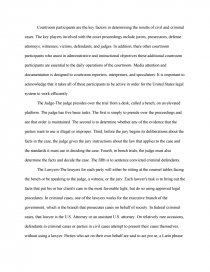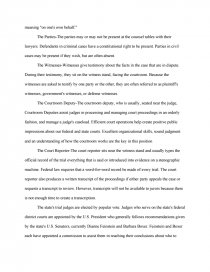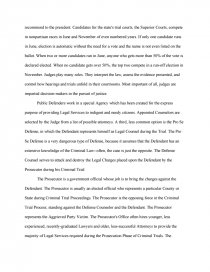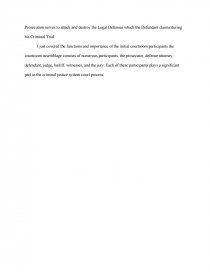Courtroom Participants
Essay by people • May 18, 2012 • Essay • 1,033 Words (5 Pages) • 1,440 Views
Courtroom participants are the key factors in determining the results of civil and criminal cases. The key players involved with the court proceedings include jurors, prosecutors, defense attorneys, witnesses, victims, defendants, and judges. In addition, there other courtroom participants who assist in administrative and instructional objectives these additional courtroom participants are essential to the daily operations of the courtroom. Media attention and documentation is designed to courtroom reporters, interpreters, and speculators. It is important to acknowledge that it takes all of these participants to be active in order for the United States legal system to work efficiently.
The Judge-The judge presides over the trial from a desk, called a bench, on an elevated platform. The judge has five basic tasks. The first is simply to preside over the proceedings and see that order is maintained. The second is to determine whether any of the evidence that the parties want to use is illegal or improper. Third, before the jury begins its deliberations about the facts in the case, the judge gives the jury instructions about the law that applies to the case and the standards it must use in deciding the case. Fourth, in bench trials, the judge must also determine the facts and decide the case. The fifth is to sentence convicted criminal defendants.
The Lawyers-The lawyers for each party will either be sitting at the counsel tables facing the bench or be speaking to the judge, a witness, or the jury. Each lawyer's task is to bring out the facts that put his or her client's case in the most favorable light, but do so using approved legal procedures. In criminal cases, one of the lawyers works for the executive branch of the government, which is the branch that prosecutes cases on behalf of society. In federal criminal cases, that lawyer is the U.S. Attorney or an assistant U.S. attorney. On relatively rare occasions, defendants in criminal cases or parties in civil cases attempt to present their cases themselves, without using a lawyer. Parties who act on their own behalf are said to act pro se, a Latin phrase meaning "on one's own behalf."
The Parties-The parties may or may not be present at the counsel tables with their lawyers. Defendants in criminal cases have a constitutional right to be present. Parties in civil cases may be present if they wish, but are often absent.
The Witnesses-Witnesses give testimony about the facts in the case that are in dispute. During their testimony, they sit on the witness stand, facing the courtroom. Because the witnesses are asked to testify by one party or the other, they are often referred to as plaintiff's witnesses, government's witnesses, or defense witnesses.
The Courtroom Deputy-The courtroom deputy, who is usually, seated near the judge, Courtroom Deputies assist judges in processing and managing court proceedings in an orderly fashion, and manage a judge's caseload. Efficient court operations help create positive public impressions about our federal and state courts. Excellent organizational skills, sound judgment and an understanding of how the courtroom works are the key in this position
The Court Reporter-The court reporter sits near the witness stand and usually
...
...



